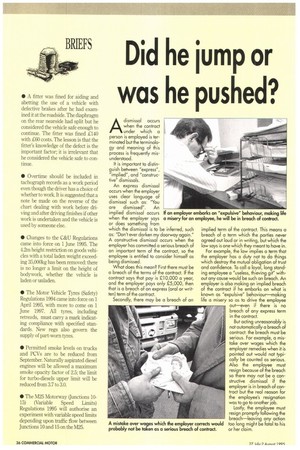Did he jump or was he pushed?
Page 38

If you've noticed an error in this article please click here to report it so we can fix it.
Adismissal occurs when the contract under which a person is employed is terminated but the terminology and meaning of this
i process s frequently misunderstood, It is important to distinguish between "express", "implied", and "constructive" dismissals.
An express dismissal occurs when the employer uses clear language of dismissal such as: "You are dismissed". An implied dismissal occurs when the employer says or does something from which the dismissal is to be inferred, such as: "Don't ever darken my doorway again." A constructive dismissal occurs when the employer has committed a serious breach of an important term of the contract, so the employee is entitled to consider himself as being dismissed. What does this mean? First there must be a breach of the terms of the contract. If the contract says that pay is £10,000 a year, and the employer pays only £5,000, then that is a breach of an express (oral or written) term of the contract.
Secondly, there may be a breach of an implied term of the contract. This means a breach of a term which the parties never agreed out loud or in writing, but which the law says is one which they meant to have in.
For example, the law implies a term that the employer has a duly not to do things which destroy the mutual obligation of trust and confidence. To call a loyal, long standing employee a "useless, thieving git" without any cause would be such an breach. An employer is also making an implied breach of the contract if he embarks on what is lkienown as "expulsive" behaviour—making i a misery so as to drive the employee out—even if there is no breach of any express term in the contract.
But acting unreasonably is not automatically a breach of contract: the breach must be serious. For example, a mistake over wages which the employer remedies when it is pointed out would not typically be counted as serious. Also the employee must resign because of the breach so there may not be a constructive dismissal if the employer is in breach of contract but the real reason for the employee's resignation was to go to another job. Lastly, the employee must resign promptly following the breach—leaving any action too long might be fatal to his or her claim.
























































































